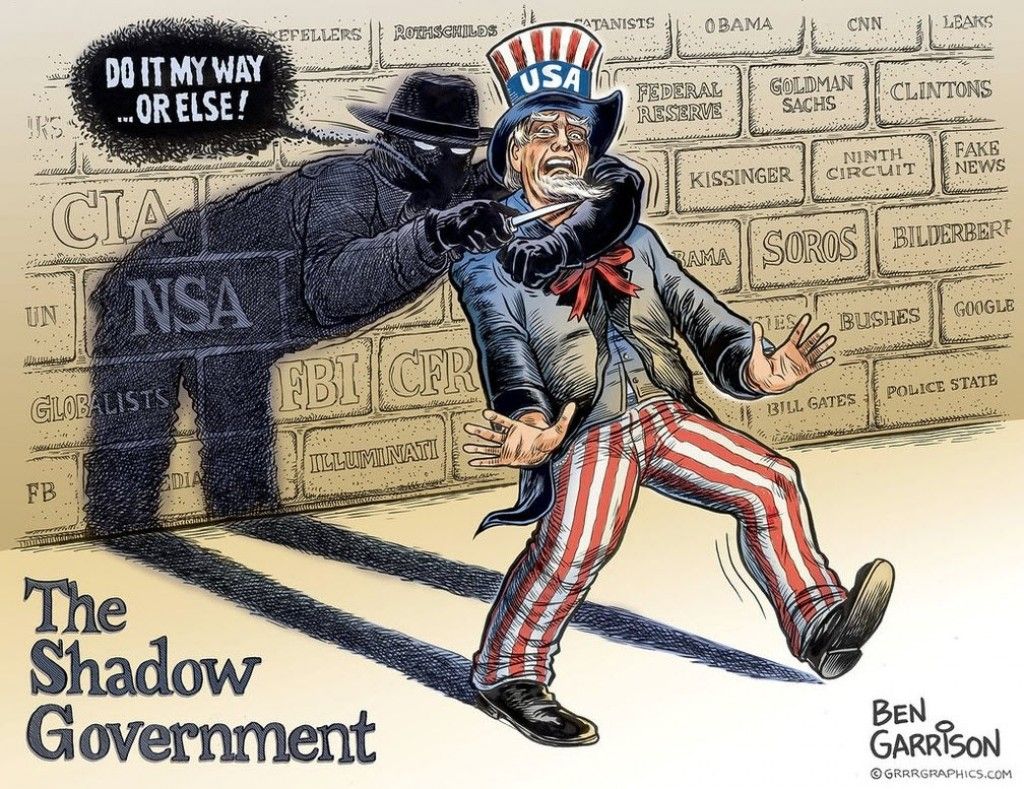The 'deep state' is real. But are its leaks against Trump justified?
The 'deep state' is real. But are its leaks against Trump justified?
Even the most severe critics of the US president should worry about this subtle form of anti-democratic abuse

Sun 22 Apr 2018 07.00 BSTLast modified on Thu 5 Jul 2018 21.45 BST

America doesn’t have coups or tanks in the street. But a deep state of sorts exists here and it includes national security bureaucrats who use secretly collected information to shape or curb the actions of elected officials.
Some see these American bureaucrats as a vital check on the law-breaking or authoritarian or otherwise illegitimate tendencies of democratically elected officials.
Others decry them as a self-serving authoritarian cabal that illegally and illegitimately undermines democratically elected officials and the policies they were elected to implement.
The truth is that the deep state, which is a real phenomenon, has long been both a threat to democratic politics and a savior of it. The problem is that it is hard to maintain its savior role without also accepting its threatening role. The two go hand in hand, and are difficult to untangle.
The deep state has been blamed for many things since Donald Trump became president, including by the president himself. Trump defenders have used the term promiscuously to include not just intelligence bureaucrats but a broader array of connected players in other administrative bureaucracies, in private industry, and in the media.

But even if we focus narrowly on the intelligence bureaucracies that conduct and use information collected secretly in the homeland, including the FBI, National Security Agency (NSA), and National Security Council, there is significant evidence that the deep state has used secretly collected information opportunistically and illegally to sabotage the president and his senior officials – either as part of a concerted movement or via individuals acting more or less independently.
The hard questions are whether this sabotage is virtuous or abusive, whether we can tell, and what the consequences of these actions are.
Since Trump was elected, unusually sensitive leaks of intelligence information designed to discredit him and his senior leadership have poured forth from current and former intelligence officials in the deep state.
The first major one, in February 2017, concerned a court-approved NSA wiretap of a phone conversation between Russia’s ambassador to the United States, Sergey Kislyak, and incoming national security adviser Michael Flynnthat concerned, among other things, the possible removal of Russia sanctions imposed by President Obama. Flynn had denied that the men discussed sanctions, and the leak revealing his lie led to his resignation.Advertisement
Another major leak concerned communications intercepts during the campaign of Russian government officials discussing potentially “derogatory” information about Trump and top campaign aides. Other leaks in this vein included intercepts of Russian officials claiming they could influence Trump through Flynn, of Kislyak supposedly informing Moscow that he discussed campaign-related issues with then-Senator Jeff Sessions, and of Kislyak discussing in a communication to Moscow that Trump’s son-in-law, Jared Kushner, wanted to communicate via a secure channel.
These leaks probably mark the first time ever that the content of foreign intelligence intercepts aimed at foreign agents that swept up US-person information was leaked. They clearly aimed to damage US persons – ones who happen to also be senior US government officials.

'A political volcano just erupted': is the US on the brink of the next Watergate? Read more
They were unlawful and, beyond that, they violated two until-now strict taboos about leaks – first on revealing the content of foreign intelligence information collected through electronic surveillance, and second on revealing the content of incidentally collected information about American citizens.
Many people, including many who are not in the Trump camp, have interpreted these leaks to violate a third taboo by marking a return to the Hoover-era FBI’s use of secretly collected information to sabotage elected officials with adverse political interests.
The comparison is plausible in light of the extensive efforts soon after the election to encourage the bureaucracy, including the intelligence bureaucracy, to resist the Trump administration, and the evidence that there was in some agencies such resistance.
But while Hoover did many awful things in quiet, neither during his reign nor at any other time in American history have we seen such a profusion of sensitive leaks from the deep state with such an overtly political aim to bring down senior leadership.

The latest major Trump resignations and firings Read more
There is, of course, the possibility that the anti-Trump leaks, on their face political and unprecedented, were nonetheless justified whistleblowing, akin perhaps to leaks about illegal surveillance programs or about illegal interrogation practices at CIA black sites. Put another way, it is possible that the benefits of the leaks, considered narrowly, outweigh the evil inherent in breaching the first two taboos above.Advertisement
The situation the leaks are a response to is itself extraordinary to the point of being unprecedented. The then acting attorney general of the United States, Sally Yates, believed that Flynn, the new national security adviser, was compromised by the Russians and vulnerable to blackmail, and so warned the White House, which seemed to take no steps in response to the information.
More broadly, a number of very odd circumstances suggested unusual and potentially corrupt connections between the Trump campaign and administration and the Russian government, about which the FBI had been conducting a counterintelligence investigation since the summer of 2016.
All of this came in the context of the unprecedented Russian DNC hack designed, our intelligence agencies tell us, to help Donald Trump win the election. And then once in office, Trump himself engaged in vicious and in many instances false attacks on the intelligence community and justice department investigators.
Do these unprecedented circumstances justify the unprecedented deep state leaks?
At no other time have we seen such a profusion of sensitive leaks from the deep state with such an overtly political aim
The lines crossed by the deep state leaks against Trump were thought to be absolute ones until 2017. But we have never faced a situation in which the national security adviser, and perhaps even the president of the United States, presented a credible counterintelligence threat involving one of our greatest adversaries.
Perhaps the facts will develop to give us enough clarity about the Russia-Trump connections to be able to make a better judgment along the lines of the judgment history has made about previous virtuous leaks. But perhaps we will never have clarity, and thus won’t be able to reach consensus on whether the leaks were justified.Advertisement
However those matters develop, the whole ordeal has already done great damage to both the presidency and the national security bureaucracy.
As deep state officials get a taste for the power that inheres in the selective revelation of such information, and if the leaks are not responded to with severe punishments, it is easy to imagine the tools that brought down Flynn being used in other contexts by national security bureaucrats with different commitments and interests.
Even the most severe critics of Trump should worry about this subtle form of anti-democratic abuse. The big loser in all this will probably be the national security bureaucracy itself and, to the extent it is weakened, the security of the American people.

Even if it turns out that Flynn and others close to Trump were in the bag for the Russians, many people will for a long time view the anti-Trump leaks as political abuse of intelligence to harm political enemies.
This perception will be deepened by the Trump administration’s relentless and often false attacks on the integrity of the intelligence community, including its false suggestion that the original collection that incidentally captured Flynn’s communications, as opposed to the leaks of such information, was illegitimate.
The Flynn and related leaks didn’t just violate the law – they violated a core commitment the intelligence community made in after the era of Hoover not to politicize, or appear to politicize, the use of surveillance tools or the fruits of their use.
Can it Happen Here? review: urgent studies in rise of authoritarian America Read more
The whole intelligence collection system – which has an importance that far transcends its undoubtedly large importance in this discrete context – is vulnerable here for the simple reason that the inter-mixture of politics with intelligence collection is the intelligence system’s Achilles’ heel.Advertisement
If surveillance comes to be seen through a domestic political lens, with domestic political winners and losers, the intelligence community will have a very hard time acting with needed public credibility. And that in turn means it will have a harder time doing what it needs to do to keep us safe.
- Jack Goldsmith is Henry L Shattuck professor of law at Harvard University and a senior fellow at the Hoover Institution. He is the author, most recently, of Power and Constraint: The Accountable Presidency After 9/11 (W W Norton 2012)
- Adapted from the essay Paradoxes of the Deep State by Jack Goldsmith, which appears in the book Can it happen here?: Authoritarianism in America. Edited by Cass R Sunstein. Copyright © 2018 by Cass R Sunstein. Reprinted by permission of Dey Street Books, an imprint of HarperCollins Publishers
As the Mueller investigation unfolds …
… The Guardian offers clarity at this critical moment in American history. As the most momentous political probe since Watergate plays out, we will continue to provide insight, analysis and factual reporting to help bring the truth to light.
But we need your help, too. More people, all around the world, are reading and supporting The Guardian’s independent, investigative journalism. And unlike many news organisations, we have chosen an approach that allows us to keep our reporting accessible to everyone, regardless of where they live or what they can afford.
The Guardian is editorially independent, meaning we set our own agenda. Our journalism is free from commercial bias and not influenced by billionaire owners, politicians or shareholders. No one edits our editor. No one steers our opinion.
This is important as it enables us to give a voice to those less heard, challenge the powerful and hold them to account. It’s what makes us different from so many others in the media, at a time when factual, honest reporting is critical.